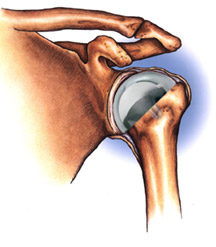Shoulder Resurfacing Surgical Treatment

Shoulder (humeral head) resurfacing is designed to cap only the top of the humerus. This procedure utilizes a metal (cobalt chromium) cap that resurfaces the head of the humerus.
This conservative procedure makes the technique less invasive than traditional shoulder replacement surgery. This technique may require a smaller incision and less bone removal, which can allow you to recover more quickly and with less pain.
The implant can also help prolong or avoid the need for future total shoulder replacement. However, if you should need total shoulder replacement in the future, humeral head resurfacing allows your surgeon the ability to perform the procedure with a less-invasive approach.
Shoulder (humeral head) resurfacing is one option available to you and your surgeon. Only your orthopedic surgeon can determine if you are a candidate for this implant or if another type of implant would better suit your unique situation.
Shoulder Resurfacing Complications
While uncommon, complications can occur during and after surgery. Some complications include infection, implant breakage, nerve damage, and fracture. Although implant surgery is extremely successful in most cases, some patients still experience stiffness and pain. No implant will last forever and factors such as the patient’s post-surgical activities and weight can affect longevity. Be sure to discuss these and other risks with your surgeon.
Preparing for Shoulder Resurfacing Surgery
Patients should begin preoperative strengthening exercises to help them prepare for surgery and their recovery. Patients may be given a comprehensive nutrition plan to help ensure optimum health before surgery.
There are many things that your surgeon may do to minimize the potential for complications. Your surgeon may have you see a medical physician before surgery to obtain tests. You may also need to have your dental work up to date and may be shown how to prepare your home to avoid falls.
After Shoulder Resurfacing Surgery
After surgery, you probably will be hospitalized for 1 to 2 days. The day after surgery, the bandages will be removed, and you will begin conservative physical therapy to restore motion and promote blood flow and to facilitate the recovery process to your shoulder.
You may wear a sling for up to 6 weeks after surgery to protect the soft tissues in your shoulder while they are healing. During this time, a physical therapist will teach you a variety of stretching exercises that will help you restore motion to your shoulder.
At home, it is important to continue with your exercises as your physician has instructed. It is a good idea to enlist the help of friends or family to help you once you do return home.
Shoulder Resurfacing Recovery
Recovery after shoulder resurfacing surgery is substantially reduced as compared to total shoulder replacement. Every person’s recovery time will vary, but most people should be able to drive in 2 to 6 weeks, garden in 2 months, and golf in 3 months after surgery. Your surgeon will tell you when you can return to these activities and will also tell you which activities to avoid.
You will typically not be allowed to participate in high-impact activities or contact sports. These types of activities place extreme pressure on the shoulder joint, which could lead to complications.
Rotator Cuff Tear Symptoms
Symptoms usually include pain, weakness and tenderness in the shoulder when reaching overhead, behind the back, when pulling and when lifting items. Symptoms may show up immediately or gradually, depending on the extent of the injury.
All patient education materials are provided by OrthoPatientEd.com and have been reviewed by our Advisory Board of leading Orthopedic Surgeons to ensure accuracy. All materials are provided for informational purposes only and are not intended to be a substitute for medical advice from your orthopedic surgeon. Any medical decisions should be made after consulting a qualified physician.
This site includes links to other websites. OrthoPatientEd.com takes no responsibility for the content or information contained in the linked sites.
